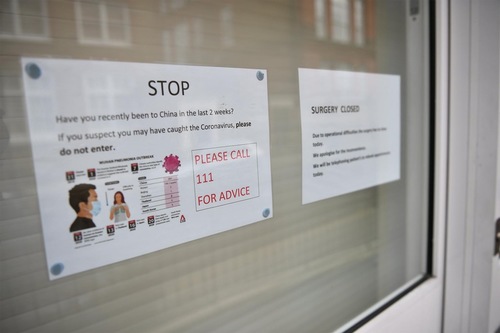Why are the UK public avoiding their GP?
Over half of the UK say that Covid-19 has made them more likely to try and diagnose their own symptoms instead of consulting a healthcare professional, a YouGov study conducted on behalf of Thermo Fisher Scientific Inc, has found.
The new analysis, based on a survey of more that 2,000 UK residents, shows that many are still reluctant to visit their GP when symptoms of an illness or health condition appear and will instead try to manage their condition alone.
52% say that the pandemic has made them more likely to try and diagnose their own symptoms. The survey also showed that 39% are reluctant to visit their GP at this time because didn’t want to waste their GP’s time. A quarter of respondents stated that they didn’t want to visit their GP because they were worried about catching Covid-19.
Avoiding the GP surgery has serious implications for many health conditions including allergy, where the UK has some of the highest prevalence rates in the world.
Affecting over 20% of the UK population, allergy can prove fatal without an accurate diagnosis. Despite this, more than a third of those surveyed said they believed allergy to be a ‘minor health condition’. Almost half incorrectly agreed that allergy was simply a more severe type of intolerance.
When asked in which ways they would respond if they or a family member developed symptoms of an allergy, 59% said that they would search online for information and 56% would buy over the counter medication, such as antihistamines. 26% would consult a family or friend, only 10% would contact a patient charity and 8% would buy an online test.
Amena Warner, Head of Clinical Services at Allergy UK, says, “We need to take allergy seriously and stop treating allergy and allergic asthma as ‘minor’ health conditions. Attempting to manage these kinds of conditions alone, without accurate diagnosis, can be dangerous.”
In the 20 years leading up to 2012, there was a 615% increase in the rate of hospital admissions for anaphylaxis in the UK. Today, a staggering 44% of British adults suffer from at least one allergy and the number continues to rise (1).
The most accurate way to discover a person’s allergy triggers, and potentially save lives, is through specific IgE testing*. Accurate testing is available through GP surgeries, yet almost two thirds (63%) stated they were not aware that this was the case. 80% of those surveyed, however, said that Covid-19 had made them aware that testing in order to track and trace diseases was important.
Warner continues, “Always speak to your doctor first and discuss options for getting a specific IgE test for what may be triggering your allergic symptoms and avoid trying to source online or unvalidated tests.”
–End–
Editor’s Notes
Thermo Fisher Scientific Inc. (NYSE: TMO) is the world leader in serving science, with annual revenue exceeding $25 billion. Our Mission is to enable our customers to make the world healthier, cleaner and safer. Whether our customers are accelerating life sciences research, solving complex analytical challenges, improving patient diagnostics and therapies or increasing productivity in their laboratories, we are here to support them. Our global team of more than 75,000 colleagues delivers an unrivaled combination of innovative technologies, purchasing convenience and pharmaceutical services through our industry-leading brands, including Thermo Scientific, Applied Biosystems, Invitrogen, Fisher Scientific, Unity Lab Services and Patheon. For more information, please visit Thermo Fisher Scientific.
Allery UK is the leading UK patient charity dedicated to helping adults and children with all types of allergy. They work with government, professional bodies, HCPs and corporates to help improve the lives of millions of people with allergic disease. To find out more, please visit Allergy UK.
*IgE tests, or immunoglobulin E tests, measure the levels of IgE, a type of antibody. Antibodies are made by the immune system to protect the body from bacteria, viruses and allergens. IgE antibodies are normally found in small amounts in the blood, but higher amounts can be a sign that the body overreacts to allergens. This can lead to allergic reaction. IgE testing is the most accurate and conclusive method to find out if you have an allergy.
Research was conducted amongst a group of 2045 adults (18+) nationwide. Fieldwork was carried out between the 26th – 29th June. The survey was carried out online and the figures have been weighted and are representative of GB adults.
Case Studies Available, please let us know if you would like to interview.
For further information please contact: Pauline Kent at Satellite PR
pauline@satellitepr.com Telephone: 0207 702 6543 or 07809195871
